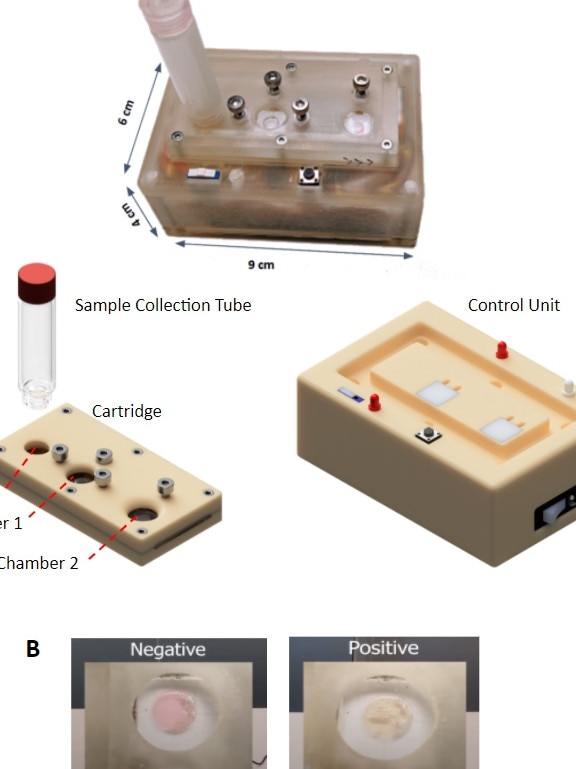Pocket device can detect COVID in minutes
A small, battery powered device capable of detecting COVID-19 and other viruses within 35 minutes has been developed by Monash University.

Coronavirus
Don't miss out on the headlines from Coronavirus. Followed categories will be added to My News.
Melbourne scientists are pushing to put the power of a laboratory into a person’s pocket, complete with the ability to detect COVID-19 and a host of other conditions on the spot.
A small, battery powered device capable of being programmed to detect COVID-19 or other viruses, bacteria or genetic material within 35 minutes has been developed by a Monash University team.
As well as helping pathologists diagnose various medical conditions, Professor Patrick Kwan believes his molecular testing device also has the power to transform food safety processes by detecting concerns such as salmonella during milk collection or wide-scale testing for antibiotic resistance.
In trials backed by The Alfred hospital, the Monash device is proving highly successful at detecting COVID-19, raising hopes it could accelerate moves for a COVID-normal by allowing screening at borders and mass gatherings such as sports stadiums, concerts or weddings.
“What we have developed is a physical device that can be used for any other test – infection or any sort of genetic testing,” Prof Kwan said.
“For COVID-19 you could bring it on board for cruise ships, sports centres and places where you don’t traditionally have testing access.”

Like gold-standard laboratory COVID-19 tests, the Monash device screens patient samples for genetic RNA material particular to the SARS-CoV-2 virus, rather than antibodies that indicate whether a person has had the illness previously.
Pre-print results published on the Europe PMC journal state the devices loop mediated isothermal amplification process, or LAMP, can indicate whether an individual has COVID-19 within 35 minutes by making a reagent turn from pink to yellow.
By changing the LAMP primers to search for other types of RNA material, Prof Kwan said the device could be adapted to test for other respiratory viruses, bacteria or other concerns.
While the COVID-19 pandemic accelerated development of the point-of-care nucleic acid amplification test, Prof Kwan said its potential would expand in coming years.
While work continues to assess the Monash device’s performance in detecting COVID-19 in clinical cases, Associate Professor James McMahon of The Alfred’s Department of Infectious Diseases said he was excited about applying this technology to other infections.
“These rapid testing platforms will shorten the time to getting results meaning people will be able to get back to their normal activities sooner,” Assoc Prof McMAhon said.
“They are also hugely advantageous for people who can’t easily get to testing centres – the testing centre can come to them.”


